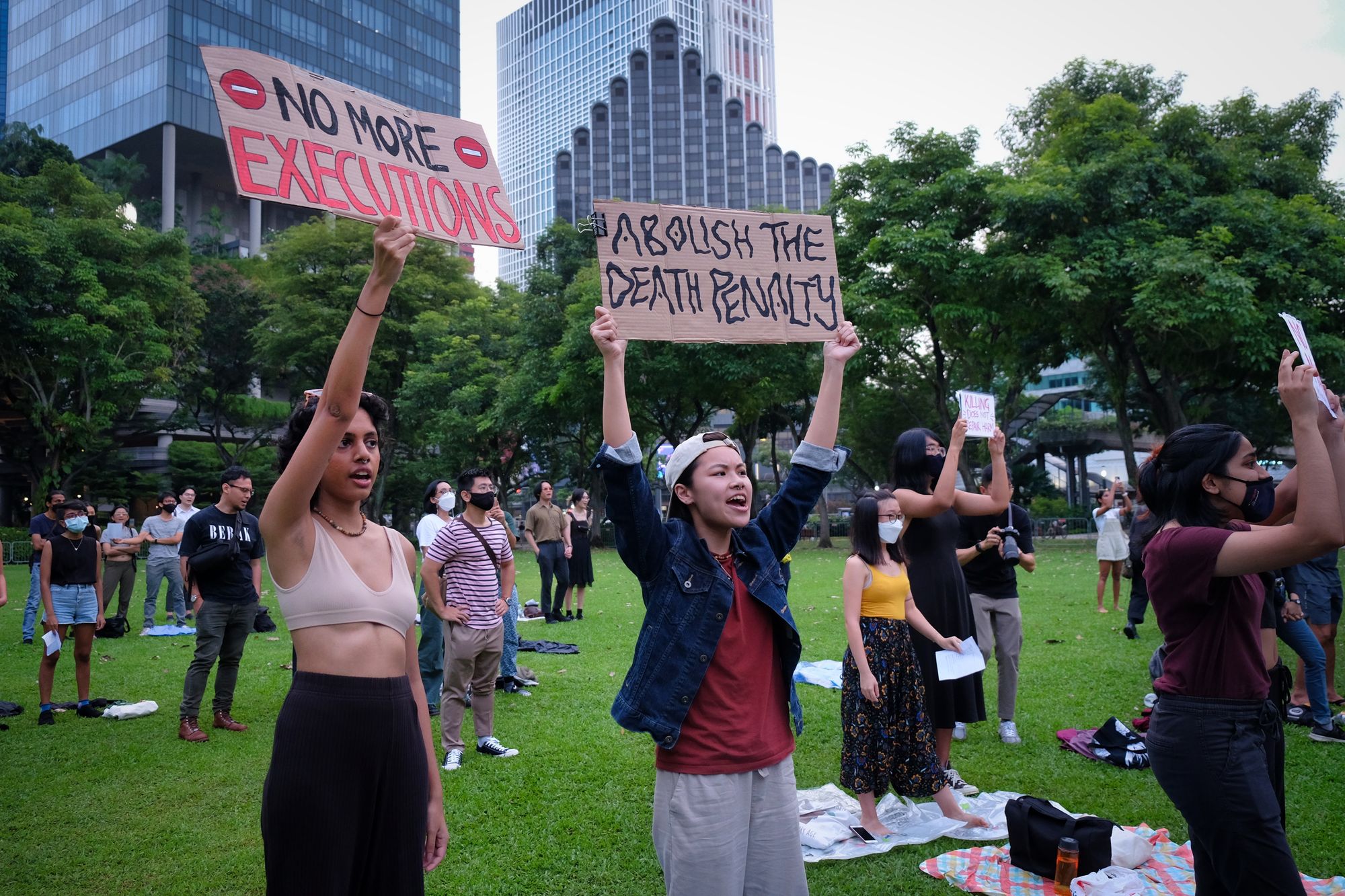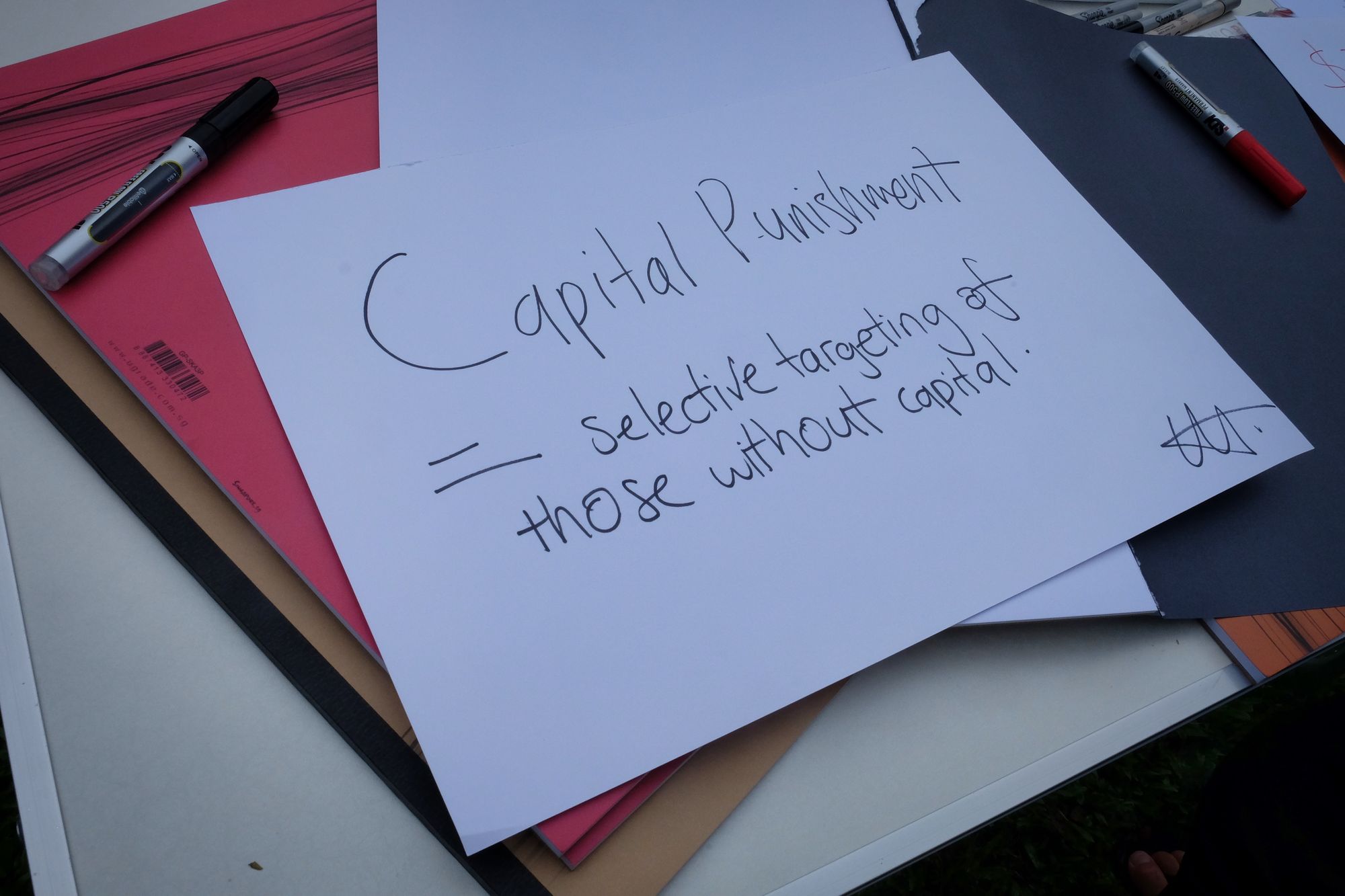I took quite a bit of this past week off, reading and doing cross-stitch instead of working. It was a much needed break! ☺️ I hope everyone has had time to rest too.
Execute justice, not life
Hong Lim Park is finally open for public gatherings again. First up in the space was a protest against the death penalty.
I'd been quite pessimistic and nervous about what the turn-out would be like, but was floored by the response. Over 400 people showed up; according to the sensor installed by the government, at its peak there were about 475 people in the park. Participants made placards, cheered on the speeches and performances, and joined in on chanting.

It was really heartening to see so much support and solidarity. When the government insists on its own narrative and on carrying out executions, it often feels like screaming into the void. It often feels like we're getting nowhere. Sunday demonstrated that anti-death penalty work is reaching people, and that there are many Singaporeans who care deeply and are engaged in critical reflection on issues like poverty, inequality, criminal punishment and justice.
I spoke at the event alongside many others. We're still working on subtitling various speeches and performances to post on social media, but for now, here's a clip of one of the most powerful moments of the protest, when the names of the 62 prisoners on death row were read out, with the crowd chanting "say their name!" after every one:
The government doesn't publish the number of people on death row, nor a list of death row prisoners, so this list was put together based on the Transformative Justice Collective's research. People on death row are generally hidden away and forgotten, so it was so powerful for all of us to hear their names and recognise their humanity.
More and more incarceration
The government is studying the option of further detaining sex offenders even after they have served their sentence. It's early days yet, according to Minister for Home Affairs and Law K Shanmugam, but the idea is that there would be no "automatic release" for sex offenders deemed as "dangerous" at the end of their jail terms. Instead, they'll be assessed, and if considered to still pose a threat, they'll continue to be detained behind bars.
I'm aware that sex offenders aren't likely to get much public sympathy, but I find this to be a troubling proposal that raises many questions: How will people be assessed, and who will do the assessing? What access to justice will people have? Will they have legal counsel to argue their case? Does the matter go back to the courts for consideration, or will this be an administrative or executive decision? What does this say about the authority of the courts? What does it mean to have someone serve their sentence for an offence, then say at the point of release that this sentence was not enough and that they have to be detained further in prison?
There are still many missing details, but I'm very wary of this becoming yet another regime under which the government can detain people as long as it deems fit, without open trials. If that's the case, we'll be setting up another system for which there are inadequate checks and balances. Anyway, I don't think it really solves problems for us to go for ever-increasing amounts of incarceration.
Is TraceTogether headed out?
Minister for Health Ong Ye Kung says that the government will review the use of TraceTogether and discontinue it if it's no longer necessary. He acknowledged that it's already not being used with the general public, since the authorities are no longer contact-tracing every Covid+ case. (It's still used in places like schools.)
SafeEntry, though, is going to stick around for a bit more, since it's the most convenient way to check one's vaccination status. It looks like it'll only be stopped when the government decides to end vaccination-differentiated measures.
Got some more...
🧑🏻💼 The government is planning to set up a Public Defender's Office by the end of the year. This means that there'll be lawyers employed by the office to take on cases. The cut-off for household income will be increased from $950 to $1,500, so more people can benefit from legal aid if they need it. However, a number of offences are still excluded, and a "strong means test approach" will be taken.
🗳 A survey by CNA and IPS have found that more Singaporeans are willing to accept a non-Chinese prime minister.
Checking in on the neighbours
This section disappeared for awhile as I ran out of time/energy to really keep up with the news in the region, but I'm going to try harder to stick to it.
🇲🇲 It's been over a year since the coup in Myanmar. It's been a painful double whammy of state violence and the Covid-19 pandemic, and this had had a horrible effect on the mental and psychological health of children. Frontier Myanmar has this story on the trauma of children who have had to flee their homes, or who have lost at least one parent.
🇲🇾 Malaysia is also talking about ending their digital contact-tracing system, MySejahtera. There was recently controversy about this app and the lack of transparency and clarity of its ownership, which has led to concerns about how the data is handled and stored.

Thank you for reading this week! As usual, feel free to spread the word about this newsletter and encourage people to subscribe!
